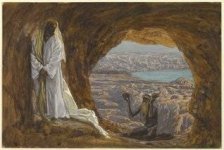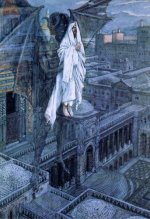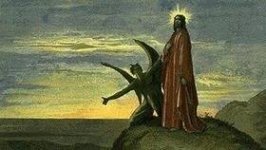To begin, we are not attempting to discuss the historical accuracy and validity of the Gospels or of any of the recorded teachings of Jesus. Such matters are not the concern of we who are not interested in dogma and religion. Knowing that the Gospels were not written while Jesus walked the earth and that they have been translated and edited many times, it must be understood that these documents cannot be seen as verbatim or perfect accounts. However, if we examine the teachings of Jesus as they were written and handed down we can still obtain a relatively clear picture of his overall message. This message differs greatly from what religion has attempted to assert. The message of Jesus is a message of self-empowerment and self-mastery. The message of Jesus is one of personal divinity and occult knowledge.
Why Jesus?
We have chosen to examine Jesus in depth as he is the center of many religious teachings and traditions. Whether you believe he existed or not, the idea of Jesus is a powerful one and it has fundamentally changed the course of human evolution. His message has been taken by controllers and indoctrinators only to be perverted and misused. His status as a martyr has been manipulated and taken advantage of. His simple yet powerful message has been perverted into dogma and religion. The truth of his message and what he stood for is much different.
You do not have permission to view the full content of this post. Log in or register now.
Now, let us begin this esoteric exploration starting with some scripture from the Gospel of Luke.
About the Gospel of Luke:From Wikipedia:
"The Gospel According to Luke (You do not have permission to view the full content of this post. Log in or register now.: Τὸ κατὰ Λουκᾶν εὐαγγέλιον, to kata Loukan euangelion), commonly shortened to the Gospel of Luke or simply Luke, is the third and second longest of the four You do not have permission to view the full content of this post. Log in or register now.. It tells of the origins, You do not have permission to view the full content of this post. Log in or register now., You do not have permission to view the full content of this post. Log in or register now., You do not have permission to view the full content of this post. Log in or register now., You do not have permission to view the full content of this post. Log in or register now. and You do not have permission to view the full content of this post. Log in or register now. of You do not have permission to view the full content of this post. Log in or register now..You do not have permission to view the full content of this post. Log in or register now.
Luke and You do not have permission to view the full content of this post. Log in or register now. make up a two-volume work from the same pen, called You do not have permission to view the full content of this post. Log in or register now..You do not have permission to view the full content of this post. Log in or register now. The cornerstone of Luke-Acts' theology is "salvation history", the author's understanding that God's purpose is seen in the way he has acted, and will continue to act, in history.You do not have permission to view the full content of this post. Log in or register now. It divides the You do not have permission to view the full content of this post. Log in or register now. into three stages, with the gospel making up the first two of these – the arrival among men of Jesus the You do not have permission to view the full content of this post. Log in or register now., from his birth to the beginning of his earthly mission in the meeting with You do not have permission to view the full content of this post. Log in or register now. followed by his You do not have permission to view the full content of this post. Log in or register now., You do not have permission to view the full content of this post. Log in or register now., death and resurrection (concluding the gospel story per se). The gospel's sources are the You do not have permission to view the full content of this post. Log in or register now. (for the narrative of Christ's earthly life), the sayings collection called the You do not have permission to view the full content of this post. Log in or register now. (for his teachings), and a collection of material called the You do not have permission to view the full content of this post. Log in or register now., which is found only in this gospel.You do not have permission to view the full content of this post. Log in or register now.
Luke-Acts does not name its author.You do not have permission to view the full content of this post. Log in or register now. According to Church tradition this was You do not have permission to view the full content of this post. Log in or register now., the companion of Paul, but while this view is still occasionally put forward the scholarly consensus emphasises the many contradictions between Acts and the authentic Pauline letters.You do not have permission to view the full content of this post. Log in or register now.You do not have permission to view the full content of this post. Log in or register now. The most probable date for its composition is around 80-100 AD, and there is evidence that it was still being revised well into the 2nd century.You do not have permission to view the full content of this post. Log in or register now."
Luke 4:1-13
And Jesus being full of the Holy Ghost returned from Jordan, and was led by the Spirit into the wilderness, Being forty days tempted of the devil. And in those days he did eat nothing: and when they were ended, he afterward hungered. And the devil said unto him, If thou be the Son of God, command this stone that it be made bread. And Jesus answered him, saying, It is written, That man shall not live by bread alone, but by every word of God.
And the devil, taking him up into an high mountain, shewed unto him all the kingdoms of the world in a moment of time. And the devil said unto him, All this power will I give thee, and the glory of them: for that is delivered unto me; and to whomsoever I will I give it. If thou therefore wilt worship me, all shall be thine. And Jesus answered and said unto him, Get thee behind me, Satan: for it is written, Thou shalt worship the Lord thy God, and him only shalt thou serve.
And he brought him to Jerusalem, and set him on a pinnacle of the temple, and said unto him, If thou be the Son of God, cast thyself down from hence: For it is written, He shall give his angels charge over thee, to keep thee: And in their hands they shall bear thee up, lest at any time thou dash thy foot against a stone. And Jesus answering said unto him, It is said, Thou shalt not tempt the Lord thy God.
And when the devil had ended all the temptation, he departed from him for a season.

This scripture is a story of Jesus being tempted by ‘the devil’ while he spent time in the wilderness (assumedly to meditate on the revolutionary tasks he was about to begin). Here, Jesus has reappeared after 18 years of silence in the historical records between ages 12 and 30. He has been baptized by John the Baptist and has retreated alone into the wilderness. At face value, it is a simple story of Jesus displaying dominance over the devil. However, this devil we understand to be a symbolic representation. Jesus, having great knowledge and therefore power, had to struggle with the same thoughts that any one of us would have if we possessed such knowledge and power. This struggle is highlighted in the temptations that ‘the devil’ offered to him.
First, we find Jesus fasting and not eating anything. This may have been literal as a means of self-discipline and willpower building but it could also be entirely symbolic of self-discipline without intending a literal fast. Whatever the case, we find this devil tempting Jesus to set aside his self-discipline and turn a stone into bread so that he may eat. Jesus responds by saying that man cannot live by bread alone but by “every word of God.” Understood esoterically, this means that we must not live a purely material existence focused only on sustaining our physical needs but that we must also seek knowledge of a higher source. Self-discipline is most certainly part of that “word of God” and any true spiritual seeker knows the importance of the same.
Next, we find ‘the devil’ taking Jesus up on a high mountain and showing him all the kingdoms of the world in what must have been a vision as it is said to have occurred in only “a moment of time”. What god would allow any devil to lead him up a mountain to begin with? Are we to believe that Jesus literally followed the devil up a mountain? Or are we to believe that Jesus was overcome by visions from the devil for a moment? The idea that Jesus is THE GOD embodied in flesh seems unlikely at best due to this observation. Would THE GOD be led by THE DEVIL or be overcome by any visions from him? This is only more evidence that Jesus was a man that was struggling with his own inner devil just as we all do. Continuing now, Jesus is on the high mountain and he sees a vision of all the kingdoms on earth. The devil then offers to give Jesus power over all of it if he just worships him. This is all symbolic of the inner struggle Jesus was having in regards to the next stage of his life. With the knowledge he possessed, he knew that he could either help fix the world or he could become very powerful within it. What Jesus said in response to this temptation is very revealing. “Thou shalt worship the Lord thy God, and him only shalt thou serve.” This was Jesus acknowledging the flawed logic in serving a temporary master – the mortal, human life. No amount of earthly power or wealth matters upon death. Jesus, citing old Hebrew law, highlighted that one should only serve the higher, true and immortal reality. Serving anything earthly or mortal is inevitably futile and worthless.

Finally, we find that the devil brings Jesus to a high point on the temple in Jerusalem. Again, would THE GOD as imagined by religion be led by THE DEVIL and placed on a high point by him? Would the Divine Creator really allow himself to be willed around like that? Doubtful at best. The story continues to say that the devil tempted Jesus to jump from the high place of the temple to have angels catch and save him. Jesus responds very simply with, “Thou shalt not tempt the Lord thy God.” This is clearly Jesus asserting his dominance over the devil by claiming his place as God over that devil. Of course, this can be taken literally or it can be taken as symbolic of Jesus claiming dominion over his own mind rather than being led by his temptations and mortal human nature. This temptation to jump from the high place can even be interpreted to be Jesus contemplating suicide. I know, I know…..that is quite a claim. Let me make it clear that this is simply a possibility that I have toyed with in my mind and I do not claim this to be factual. I am providing discourse on this possibility simply as a possibility. Pressing forward, Jesus had just spent 40 days alone in the wilderness fighting his inner devil and mortal temptations for power and wealth. Those with Knowledge of Self are often tempted with suicide because we seek the experience of the immortal afterlife prematurely knowing it to be far greater. The pain of this temporary world and the finite nature of our human life often presses us to want to just move on and not ‘waste time’ here on Earth. However, nothing can be more lacking in self-discipline than suicide. Perhaps Jesus was tempted by his devil to jump and be carried away from his mortality and just skip the hardship that he knew was to come. Jesus, realizing that this was not a real option for him, simply commanded his devil not to tempt him with such thoughts.
After all the temptation, we read that this devil departed from Jesus “for a season”. This seems to be further indication that Jesus went in to the wilderness to tame his devil, increase his self-discipline, and meditate on what he was about to do. Upon successfully completing his self-imposed training, his devil departed from him for a long period of time. This is a common theme of esoteric doctrine. Subjecting oneself to strenuous temptation and adhering to strict self-discipline decreases future temptations and makes self-discipline easier with time. This theme is not isolated to the occult as almost anyone would agree that self-discipline becomes easier over time and the more it is practiced the less the temptations are to violate it.
If the story is interpreted in this manner rather than literally, it not only makes more sense but it satisfies some inconsistencies within the story such as the supposed Creator God being led by and influenced by the supposed Devil. It is much more relatable, logical, and sensible to believe that Jesus went to the wilderness to meditate, practice self-discipline, and prepare himself for the journey he was about to embark upon not as a God but as a man aware of his own connection with The All.
Luke 5:36-39
And he spake also a parable unto them; No man putteth a piece of a new garment upon an old; if otherwise, then both the new maketh a rent, and the piece that was taken out of the new agreeth not with the old. And no man putteth new wine into old bottles; else the new wine will burst the bottles, and be spilled, and the bottles shall perish. But new wine must be put into new bottles; and both are preserved. No man also having drunk old wine straightway desireth new: for he saith, The old is better.
Here we find Jesus telling a parable. He is discussing the absurdness of repairing an old garment with a new garment. Why rip the new one to repair an old one? Why not just wear the new one? He makes a similar point regarding wine. It is important to note that the word “bottles” here is not the same as we think of it now. They had wineskins in those times rather than bottles. These were essentially pouches of animal skin/leather that were made to hold wine. Then, wine was left in the wineskins to ferment and become wine rather than just grape juice. After the wine had fermented in a wineskin, the wineskin could not be used again as it would be brittle and stretched. If they were reused, the wineskin would likely burst and ruin both the container and the wine within it. Basically, Jesus was again using an absurd idea to convey a message. No one would risk losing the wine they were attempting to make by placing it in an improper container. Next, he states that no man desires new wine after having old wine. New wine is simply fresh grape juice without *******. New wine is wine that has just been squeezed from the grapes and not been fermented yet while old wine has undergone fermentation and contains *******. Basically, Jesus is saying that the old wine is better than the new. This is still typically true. Almost all quality ******* is aged. What does all of this mean? What is the point of these seemingly simple parables? When viewed with an esoteric eye, the meaning becomes clear. These parables are relatable to the process of overcoming oneself to become a new person. You cannot overcome your old ways and your old self by simply patching in new ideas and new pieces. You have to become totally new lest the old perverts the new. You cannot place a new version of yourself in an old container or you risk losing both the new version and the old container and being left with nothing. The last parable can be seen as describing our resistant attitude towards change. The old wine is already fermented and ready while the new wine takes time. How much easier is it to settle for old wine instead of making new and being patient with the process involved? The same can be said of personal growth. It is easy just to keep doing the same thing instead of toiling and creating something new.
These concepts are common among esoteric and occult philosophy. The concept of doing away with the old self and becoming a new person through Initiation, Illumination, Enlightenment, or whatever other term you choose is common among almost all spiritual thinkers and systems. This process is often painful and we resist it. We are so often satisfied with the old wine and do not want to make any new wine. We like our old garments so we choose to ρá†ch them up rather than replacing them and in the process we just give rise to further destruction of our old garment as well as the new. We even like to try and incorporate new ideas into old habits. We place new wine in old wineskins. We continue our same behaviors and dwell in the same states of mind while trying to incorporate new ideas and justify new information with our old ways. Jesus understood the necessity of a new garment, a new wineskin, and for making new wine altogether.
Did Jesus Fulfill Old Testament Prophecy?
The truth is that no one can fully understand the Old Testament without having significant knowledge of ancient Hebrew religion, culture, science, and mysticism. It was written by Hebrew mystics about Hebrew mystics to be read by Hebrew mystics. It was not originally intended for the common folk. Prophecy and prophets were often used by the leaders to justify their future plans or even failures. (Note that this is not an isolated theme to Hebrew culture but prophecy and prophets have a long history of playing a vital role in government. Many kings have sought the council of seers, prophets, and hierophants.) The peasants couldn't typically read. These books were written by educated elites for other educated elites. When Jesus fulfilled the Old Testament prophecy it wasn't divinity speaking. It was Jesus MOCKING the Levitical priesthood by fulfilling the prophecy they had used to control the people for so long. Of course, much of this prophecy could not be validated in the first place and there were many supposed Messiahs both before and after Jesus. Anyone could claim to be this and thereby fulfill several prophesies "confirming" their status as the fulfiller of the prophecy. Realistically, he found the truth for himself in his studies and he dedicated his very life to free his people from the tyranny. The Levitical priests strung the Hebrew peasants along for centuries by simply keeping them looking for a savior from their oppression. In reality, the oppression came from the very priests themselves. The government and religion weren't separate in those times. The priests ran the entire show. They told the people that there was a savior coming so that they would not save themselves.Sadly, Jesus did not totally succeed in freeing his people as they still are in turmoil to this day while their elite families and lineages rule the world of economics almost entirely. The Romans and Levitical priests created a false religion around Jesus since he had status as a martyr. His true message wasn't the fulfillment of Old Testament prophecy. That was simply to get the people's attention and to take away the control of the priests. After the death of Jesus, early Christianity (which wasn't even called Christianity yet) leveraged this attention grabbing detail and deified Jesus in order to make their new religion more credible. Perhaps some of the details in the Bible were entirely fabricated over time to bolster his status as Divinity (i.e. the ****** birth). However, his true message lies in his parables and in his many sayings. His true message lies in his discussions and proclamations rather than in miracles and prophetic fulfillment.
credit to:
You do not have permission to view the full content of this post. Log in or register now.
Attachments
-
You do not have permission to view the full content of this post. Log in or register now.
Last edited:

